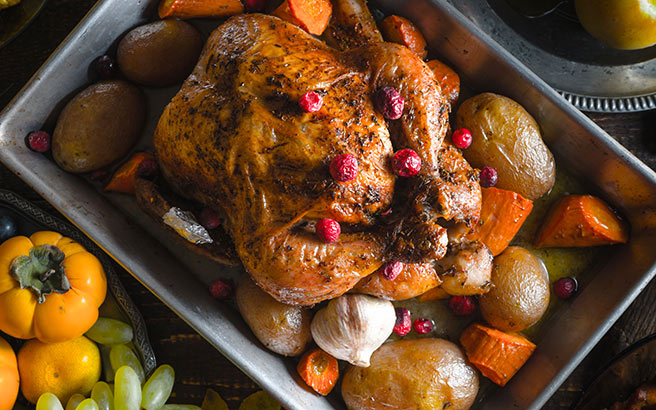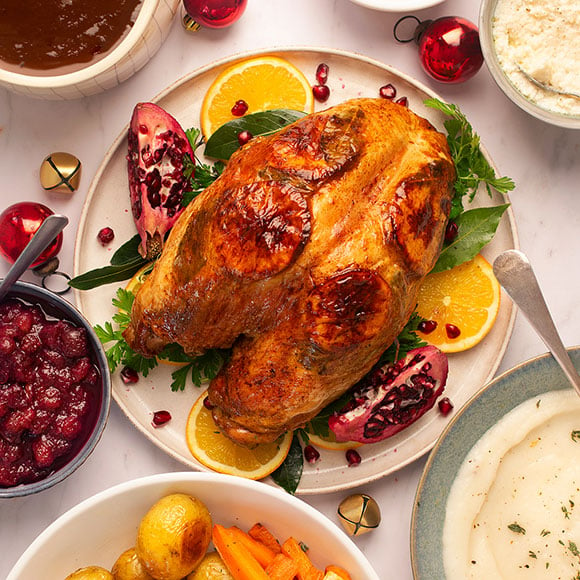One of the most enjoyable aspects of Christmas is the food and drink – it’s part of the tradition when we celebrate with family and friends.
However, many of us also worry that we’re eating too many calories – the prospect of piling on the pounds can put a dampener on even the biggest celebration.
After all, research has shown an average Christmas dinner contains as much as 7,000 calories, so given that the recommended daily intake of calories for a woman is 2,000 calories, and 2,500 for a man, it’s no wonder that we worry about putting on weight during the festive period.
But you shouldn’t necessarily feel too disheartened by what you’re eating – there are actually quite a lot of nutritional benefits from the traditional Christmas dinner.
Turkey
 The centrepiece of the majority of our Christmas dinners and – unlike red meat such as lamb, beef or pork – white meat is typically healthier, as it’s lower in saturated fats. In fact, the traditional bird contains many beneficial nutrients. For example:
The centrepiece of the majority of our Christmas dinners and – unlike red meat such as lamb, beef or pork – white meat is typically healthier, as it’s lower in saturated fats. In fact, the traditional bird contains many beneficial nutrients. For example:
- B vitamins: these help to keep the nervous system healthy and release energy from the food we eat.
- Phosphorus: a mineral that helps build strong bones and teeth.
- Protein: essential for the body to grow and repair, and important for healthy muscles and bones.
- Selenium: supports the immune system.
- Zinc: helps to make new cells, and aids wound healing.
Top tips
Opt for white meat when you can, and steer clear of the skin if you are looking to reduce your fat intake.
> Try our healthy turkey dinner with all the trimmings recipe
Nuts
 For those who don’t eat meat, or plump for a plant-based option, nut roast is a popular substitute. Many of us also tend to eat more nuts over the Christmas period.
For those who don’t eat meat, or plump for a plant-based option, nut roast is a popular substitute. Many of us also tend to eat more nuts over the Christmas period.
Nuts get a big thumbs up, in terms of their nutritional benefits. They’re rich in:
- Essential fatty acids which are good for your heart.
- Vitamin E: great for keeping your skin and eyes healthy, and supports the immune system.
- B vitamins: help energy to be released from your food, and keep your nervous system healthy.
- Fibre: helps to make you feel fuller, and aids digestion.
There’s also evidence that brazil nuts may play a role in preventing the progression of prostate cancer, based on results of a research project funded by World Cancer Research Fund.
Top tips
- Avoid salted or honey-roasted nuts, as they’ll bump up your salt/sugar intake.
Note: When we talk about nuts, we tend to mean almonds, hazelnuts, walnuts, brazil nuts, cashews and pistachios.
> Why not give our delicious chestnut loaf recipe a whirl?
Brussels sprouts
 Love or hate them, sprouts are an integral part of Christmas dinner, partly because they’re in season during winter. They’re part of the brassica family – along with broccoli, cabbage and kale – and are packed full of nutrients.
Love or hate them, sprouts are an integral part of Christmas dinner, partly because they’re in season during winter. They’re part of the brassica family – along with broccoli, cabbage and kale – and are packed full of nutrients.
- Antioxidants: these are compounds that help to reduce cell damage.
- They add veg to your plate. A diet high in fruit and vegetables (along with wholegrains and fibre) can reduce your cancer risk.
- A good source of fibre.
Top tips
- Any leafy green vegetables will be a great addition to your Christmas dinner. Why not add two?
- What about steaming your sprouts rather than boiling them? This method of cooking helps to retain more nutrients.
Potatoes
 They don’t count as 1 of your 5 A DAY, but that doesn’t mean they don’t pack a nutrient punch.
They don’t count as 1 of your 5 A DAY, but that doesn’t mean they don’t pack a nutrient punch.
- Potatoes are a good source of vitamin C, and potassium.
- They’re low in fat (unless you roast them in oil!).
Top tips
- We know how amazing roast potatoes are, but try to mix them with boiled potatoes, as a way of reducing your fat intake. Or serve baked potatoes instead.
> Try making baked potato boats with younger members of your family
Carrots
 The common assumption that carrots help you see in the dark isn’t 100% guaranteed, but there is some truth in it. In fact, carrots are:
The common assumption that carrots help you see in the dark isn’t 100% guaranteed, but there is some truth in it. In fact, carrots are:
- High in vitamin A: well actually a compound called beta-carotene (the body converts beta-carotene into vitamin A). This compound is what gives carrots their orange colour. It has important roles in helping our vision in dim light, supporting our immune system, and helping to keep our skin healthy.
- A source of potassium: needed for a healthy nervous system, and to help control the balance of fluids in the body.
Top tip
- As with parsnips (see below), carrots are already sweet, so avoid adding honey and use herbs such as thyme to enhance the flavour.
> Something different: roasted carrots with orange, lemon and tabbouleh
Parsnips
 The humble parsnip is something many people love having as part of Christmas dinner. And it has many nutritional benefits to back up its popularity.
The humble parsnip is something many people love having as part of Christmas dinner. And it has many nutritional benefits to back up its popularity.
- Vitamin C: just like the potato, parsnips are a good source of vitamin C, which helps to support the immune system.
- High in fibre: important for a healthy digestive system.
Top tip
- Leave off the honey or maple syrup glaze, as they add calories. Sprinkle with mixed herbs and black pepper for an extra flavour hit instead.
> Our parsnip and celeriac bake is a seasonal treat
Cranberries
 The vibrant red/purple sauce that accompanies our Christmas dinner is a staple. Cranberries contain a range of antioxidants: these help to protect the health of our cells.
The vibrant red/purple sauce that accompanies our Christmas dinner is a staple. Cranberries contain a range of antioxidants: these help to protect the health of our cells.
Top tip
- Shop-bought cranberry sauce is usually high in added sugar (and salt), so if you can make it yourself (or at least add some fresh cranberries), that’s a better option.
> This cranberry and pear sauce has 75% less sugar than traditional cranberry sauce
Our No.1 top tip
Remember – Christmas is just once a year. While we may eat more than we usually do, don’t worry too much; it’s important to enjoy every mouthful and the time spent with your family and friends.


 You may be surprised by the number of calories in a Christmas dinner – but there are hidden health benefits to turkey with all the trimmings.
You may be surprised by the number of calories in a Christmas dinner – but there are hidden health benefits to turkey with all the trimmings.